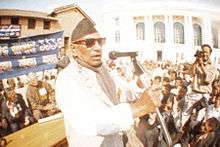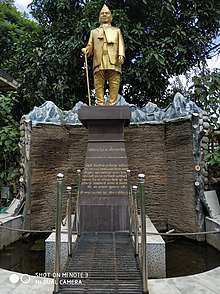Ganesh Man Singh
Ganesh Man Singh (Nepali:गणेशमान सिंह) (November 9, 1915 – September 18, 1997) was the leader of the democratic movement of 1990 in Nepal.[1] He is revered as the Father of Democracy and the Iron-man of Nepali politics.[2] He joined Praja Parishad to protest against the autocratic rule of the Ranas.
Ganesh Man Singh | |
|---|---|
 Ganesh Man Singh | |
| Born | November 9, 1915 |
| Died | September 18, 1997 |
| Organization | Nepali Congress, Nepal Praja Parishad |
| Movement | Nepalese Democratic Movement |
| Spouse(s) | Mangala Devi Singh |

Early life
Ganesh Man Singh was born on November 9, 1915[3] in Itum Bahal, Kathmandu. His father was Gyan Man Singh and mother Sanunani Shrestha Singh. His father died when he was young, so his grandfather, Ratna Man Singh (who was Badakaji in Rana regime), took care of him.
He studied in Durbar High School till class 6 when he was rusticated from the school for not respecting his fellow Rana students.[4] He then went to Calcutta to study where he completed his matriculation from Vidyasagar College in first division.[4] He studied until ISc (Intermediate of Science) then returned to Nepal in 1938.
Leader of Nepali Congress
Ganesh Man Singh was the main leaders of Nepali Congress Movement in 2007 B.S., which was able to overthrow the Rana Regime. In 2015 B.S., he was elected as Member of Parliament from Kathmandu and later became a Cabinet Minister. After coup d'état by King Mahendra, Singh became one of the main leaders advocating for democracy in Nepal. He ultimately became the Supreme leader of Nepali Congress, the title he held throughout his life.
Early political life
He entered into politics formally by joining Praja Parisad, the first political party of Nepal. in 1997 B.S. Only after three months into married life with Mangala Devi Singh, he was handed life imprisonment by Ranas for waging revolution against their autocratic rule. He successfully escaped from the prison and continued his struggle against the Ranas with Krishna Bahadur Pradhan as his pseudonym.[5]
Later life
After the coup of 1960, Singh was held without trial for eight years at the Sundarijal Military Detention Camp.[6]
Recognizing his outstanding contribution in the field of Human Rights, Mr. Singh was honored by the United Nations with “Human Rights Award” in 1993. He is the first Statesman from South Asia to receive this prestigious award.
Singh had received the “United States Peace Run Prize” in 1990 for his contribution to peace in Nepal and the world and his leadership quality. He was also decorated by the “U Thant Peace Award”.
Ganesh Man Singh Foundation
Ganesh Man Singh Foundation has been established in the commemoration of Ganesh Man Singh with the presidency of his son Prakash Man Singh.[7]
References
- https://www.britannica.com/biography/Ganesh-Man-Singh
- Ghimire, Him Lal (November 11, 2014). "The Iron Man". The Kathmandupost. Retrieved August 21, 2017.
- Letter to "Mission Pemanente, Du Royamu Du Nepal, Aupres de l'office des Nations Unies, Geneve" by Nepalese Ambassador, Jayaraj Acharya, nominating Ganesh Man Singh for Human Right Award, Page 62, श्रद्धांजली
- वीर गणेशमान सिंह स्मारिका, Page 1
- http://www.panakhabar.com/2016/09/17097/
- "Picture of Sundarijal Military Detention Camp". Nepali Congress. Archived from the original on 2002-08-02. Retrieved 2008-10-07.
- "Archived copy". Archived from the original on 2015-01-08. Retrieved 2014-11-08.CS1 maint: archived copy as title (link)
External links

- Nepal homepage
- Ganesh Man Singh Organization
- Ganesh Man Singh Academy